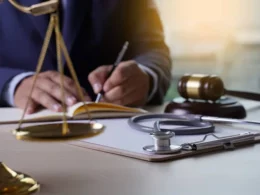When medical treatment goes sideways, you might wonder if the doctor could actually be arrested. Doctors can be arrested for medical negligence, but only when their conduct moves from simple mistakes into criminal territory—think intentional, knowing, or reckless actions that harm patients.

Most medical errors are civil matters. People usually handle them through malpractice lawsuits instead of criminal courts.
Criminal medical malpractice happens when a doctor is intentionally, knowingly, or recklessly negligent and a patient gets hurt. The big difference is the doctor’s mindset and whether their actions stray far from what’s considered normal in medicine.
You need to know when medical negligence actually becomes a crime. The jump from civil to criminal hinges on what the doctor was thinking and how severe their actions were. Simple mistakes, even with tragic results, usually aren’t crimes.
Key Takeaways
- Doctors can face criminal charges for medical negligence if their actions are intentional, knowing, or recklessly dangerous—not just honest mistakes
- Most malpractice cases are civil, meaning financial penalties, not jail
- Prosecutors must prove beyond reasonable doubt that the doctor’s actions grossly strayed from accepted medical standards
Understanding Medical Negligence

Medical negligence happens when healthcare providers don’t meet accepted standards of care. This can lead to patient harm.
How severe the negligence is decides if it’s a civil case, a professional issue, or a crime.
Definition of Medical Negligence
Medical negligence is when a healthcare professional’s actions fall below the accepted standard of care and a patient gets hurt. Your doctor didn’t give the care that other qualified doctors would have in the same situation.
There are four key elements:
- Duty of care – There was a doctor-patient relationship
- Breach of duty – The doctor didn’t meet standard care
- Causation – That breach directly caused your injury
- Damages – You suffered actual harm or losses
Not every bad result is negligence. Your doctor must have acted in a way that no reasonable professional would have in that moment.
Categories of Negligence in the Medical Profession
Medical negligence comes in different types, based on how severe and intentional the behavior was.
Ordinary negligence covers basic mistakes or slip-ups. Maybe a test was misread, or a needed test wasn’t ordered. These usually end up as civil lawsuits.
Gross negligence is way more serious. When a doctor acts with gross negligence or recklessness, criminal charges can come into play. Examples are operating while drunk or ignoring obvious warning signs.
Intentional harm is when a doctor hurts a patient on purpose. This is the worst kind, and it often leads to criminal prosecution.
Standard of Care in Medical Practice
The standard of care is what competent medical professionals would do in the same situation. It changes depending on the doctor’s specialty, where they work, and what resources they have.
Courts look at things like:
| Factor | Consideration |
|---|---|
| Medical specialty | Specialists have higher standards |
| Geographic location | Rural and urban practices differ |
| Available resources | Equipment and staff matter |
| Patient condition | Emergencies vs routine care |
Expert witnesses talk about whether the doctor met the standard. These experts need similar training and experience to be credible.
The standard isn’t set in stone. Medicine changes. What worked years ago might not be acceptable now. Doctors have to keep up with the latest practices.
Civil vs Criminal Liability for Doctors

Medical negligence cases can end up in two different legal systems, and each works differently. Civil malpractice cases have a lower burden of proof, but criminal cases need much stronger evidence.
Distinguishing Civil Law and Criminal Law
Civil law and criminal law treat medical negligence in totally different ways. In civil cases, you only have to show it’s more likely than not that the doctor messed up.
Criminal law is stricter. The state must prove “beyond a reasonable doubt” that the doctor committed a crime. That’s a much higher bar.
Key Differences:
| Civil Law | Criminal Law |
|---|---|
| Lower burden of proof | Higher burden of proof |
| Money damages | Jail time possible |
| Private lawsuit | State prosecution |
| More common | Very rare |
Criminal medical malpractice happens when a doctor is intentionally, knowingly, or recklessly negligent and someone gets hurt. Regular mistakes stay in civil court.
Role of Civil Court in Medical Malpractice Cases
Most malpractice cases go through civil court. You can sue a doctor for money if they hurt you through negligence.
Civil court tries to get you compensation for your injuries. This might cover medical bills, lost wages, and pain and suffering.
A civil jury can only award money. If a jury finds a provider responsible in a civil trial, the only penalty is financial restitution to the victim.
Doctors might face:
- Monetary damages
- Higher insurance costs
- A hit to their reputation
- Possible license review
Civil cases are way more common. Most medical errors that aren’t criminal get handled here.
Role of Criminal Court in Prosecution of Doctors
Criminal prosecution of doctors barely happens. A doctor can be sentenced to jail for malpractice only if found guilty in criminal court.
Criminal court steps in when doctors show extreme negligence or actually mean to do harm. If a doctor’s care drops below negligence and hits recklessness or intentional misconduct, they can be criminally liable.
The state has to prove the doctor’s actions were really bad. Some examples:
- Practicing without a license
- Hurting patients on purpose
- Gross negligence in surgery
- Drug-related crimes
Criminal penalties for doctors can be brutal:
- Jail or prison
- Big fines
- Losing their license
- Criminal record
The American Medical Association says recklessness or gross deviation from the standard of care should be criminally culpable, but they really don’t want regular negligence prosecuted as a crime.
When Can a Doctor Be Arrested for Medical Negligence?

Doctors might get arrested when their actions go from civil malpractice into criminal behavior. This usually means gross negligence with reckless disregard for patient safety, and prosecutors have to prove guilt beyond a reasonable doubt.
Criteria for Criminal Negligence
Criminal medical malpractice is about intent, knowledge, or reckless negligence. Simple mistakes, even if they end badly, aren’t crimes.
Criminal Charges Need:
- Intentional harm – Doctor hurt a patient on purpose
- Knowing misconduct – Doctor knew their actions could cause harm
- Reckless behavior – Doctor ignored obvious risks
The jump from civil to criminal depends on the doctor’s mindset and how severe their actions were. A bad outcome alone isn’t enough.
Criminal negligence means you took unjustifiable risks. If the risk was big and clearly unreasonable, the physician is criminally negligent.
Threshold of Gross Negligence
Gross negligence isn’t your average medical error. It’s an extreme departure from accepted standards and shows no concern for patient safety.
Some examples:
- Operating while drunk
- Doing surgery without training
- Ignoring obvious patient distress
- Using contaminated equipment and knowing it
The AMA thinks recklessness or gross deviation from standard care should be criminal, but they push back hard against prosecuting normal negligence.
Courts look at whether your actions were so far below professional standards that it’s basically criminal. Complications or honest mistakes don’t count.
Importance of Reasonable Doubt
For medical malpractice to be criminal, prosecutors must prove guilt beyond reasonable doubt. That’s a lot tougher than in civil court.
Prosecutors have to show:
- You met all elements of the crime
- You acted with criminal intent or extreme recklessness
- Your actions directly caused harm
- There’s no reasonable doubt
This high bar keeps doctors from facing criminal charges over honest mistakes. Prosecutors have to show the doctor’s conduct clearly fits the crime.
The reasonable doubt standard is there because medicine is risky and uncertain. Criminal charges should be saved for the worst cases.
Involvement of Judicial Magistrate
A judicial magistrate decides if criminal charges against a doctor should move forward. They look at the evidence and decide if there’s probable cause for arrest.
The magistrate checks if your actions count as criminal negligence and not just civil malpractice. They’ll consider your mindset, how badly you strayed from medical standards, and the harm done.
The magistrate looks at:
- Evidence of intent or gross negligence
- Expert testimony about standards
- Patient care records
- Your professional background
Hardly any doctors actually go to jail after patient deaths from negligence. Medical groups say prosecuting doctors could make them overly cautious and hurt care.
The magistrate has to weigh protecting patients from dangerous doctors against letting medical professionals make tough calls.
Landmark Legal Decisions and Guidelines

Courts have set out rules for when doctors can face criminal charges for medical negligence. The Supreme Court of India, for example, has laid down guidelines to protect doctors from unfair prosecution, and legal doctrines help sort out liability in tricky cases.
Supreme Court of India Guidelines
The Supreme Court has ruled against criminal prosecution of doctors unless gross negligence is proven. This protects doctors from arrest for simple mistakes during treatment.
Under Article 141 of the Constitution, the Supreme Court lays down the law for medical negligence cases. The court recognizes two types of legal action against doctors.
Criminal cases fall under Section 304A of the Indian Penal Code. Civil cases involve consumer complaints or tort law for compensation.
The court says gross negligence must be so reckless as to endanger life before criminal charges apply. Simple medical errors do not warrant arrest.
Key protections include:
- Burden of proof on prosecution to show gross negligence
- Professional judgment protection for reasonable medical decisions
- Standard of care based on accepted medical practices
Res Ipsa Loquitur Doctrine in Negligence Cases
Res ipsa loquitur means “the thing speaks for itself” in medical negligence cases. This legal doctrine applies when the injury could not have happened unless someone was careless.
Courts use this doctrine when:
- The injury does not normally happen without negligence
- The doctor had exclusive control over the treatment
- The patient did nothing to cause the injury
Common examples include surgical instruments left inside patients or wrong-site surgery. In these situations, you usually don’t need expert testimony to prove negligence.
The doctrine shifts the burden to the doctor to explain what happened. Still, it doesn’t automatically prove guilt for criminal charges.
Important limitations exist:
- Must involve obvious negligence
- Cannot apply to complex medical decisions
- Does not replace the need for gross negligence in criminal cases
Legal Process and Consequences for Medical Professionals

When someone accuses a medical professional of negligence, the legal system follows certain steps to figure out guilt and penalties. The results can range from civil liability to criminal charges, and these can really shake up a doctor’s career.
Investigation and Arrest Procedures
The process kicks off when authorities get a report about possible medical negligence. State medical boards and law enforcement review the evidence and decide if criminal charges make sense.
Most of the time, medical professionals face civil lawsuits instead of criminal prosecution. Still, medical malpractice becomes a criminal act if someone proves gross negligence or intentional harm.
Criminal prosecution of doctors needs evidence of extreme deviation from standard care. Investigators look at:
- Medical records and patient files
- Expert witness testimony from other doctors
- Whether the actions were grossly negligent
- If harm was intentional or just extremely careless
Law enforcement follows standard criminal justice protocols for arrest. They issue warrants based on evidence from the investigation.
Medical professionals get the same legal protections as other defendants. That includes the right to a lawyer.
Possible Penalties and Disciplinary Actions
Legal consequences of medical malpractice depend on how severe the negligence was. Criminal cases can mean jail time and big fines.
Criminal Penalties:
- Fines from thousands up to millions of dollars
- Prison sentences for gross negligence
- Probation with monitoring
- Community service
Civil Consequences:
- Monetary damages paid to victims
- Compensation for medical bills and lost wages
- Payment for pain and suffering
- Coverage of future care costs
Disciplinary actions against healthcare professionals go through state medical boards. These boards can add sanctions on top of criminal penalties.
Most cases don’t end in jail. Corrective measures like mandatory training and closer supervision are more common.
Impact on Medical License and Career
Medical licenses are at risk if a professional is found guilty of negligence. State medical boards can suspend, revoke, or restrict licenses after criminal convictions.
License Actions:
- Suspension: Temporary removal of practice privileges
- Revocation: Permanent loss of license
- Probation: Practice allowed under strict rules
- Restrictions: Only certain types of practice allowed
Medical malpractice liability and physician discipline can haunt a career for years. Even if criminal charges disappear, civil settlements can damage a doctor’s reputation.
Professional fallout goes beyond license issues. Malpractice convictions affect hospital privileges, insurance rates, relationships with colleagues, and even the ability to join insurance networks.
Recovering after a negligence finding is tough. Doctors often need extra training and have to prove they’re competent before returning to full practice.
Patient Rights and Legal Recourse

If a doctor commits medical negligence, patients have clear legal options in civil courts. You can file lawsuits, work with specialized attorneys, and gather evidence to support your claim.
Filing a Civil Lawsuit Against a Doctor
Medical malpractice cases fall under civil law, not criminal law. You can’t have a doctor arrested for negligence, but you can sue for damages.
Civil lawsuits for medical malpractice require you to prove four things. First, the doctor owed you a duty of care.
The four elements are:
- Duty of care existed
- Standard of care was breached
- Injury happened as a direct result
- Damages resulted from the injury
You can seek compensation for medical bills, lost wages, and pain and suffering. The lawsuit process usually takes months or even years.
Most states set time limits for filing these cases. The statute of limitations is often two to four years from when you discovered the injury.
Consulting a Malpractice Attorney
A specialized malpractice attorney can help figure out if your case has merit. These lawyers know the medical and legal side of things.
Key benefits of hiring a malpractice attorney:
- Familiar with medical terms
- Access to expert witnesses
- Knowledge of local laws
- Ability to negotiate with insurance companies
Many malpractice attorneys work on contingency fees. You pay only if you win your case.
The attorney reviews your records and consults experts. They decide if the doctor’s actions fell below accepted standards.
Steps to Gather Evidence for a Case
Strong evidence makes medical malpractice cases more likely to succeed. Start collecting documents as soon as you suspect negligence.
Essential evidence includes:
- Complete medical records
- Test results, X-rays, and scans
- Prescription and medication lists
- Bills and receipts for expenses
- Employment records for lost wages
Keep notes about your symptoms, treatments, and conversations with staff. Take photos of visible injuries if you can.
Request your medical records right away. Hospitals and doctors must provide them if you ask in writing.
Your attorney brings in experts to review the evidence. These experts testify about whether the standard of care was met in your case.
Frequently Asked Questions

Understanding when medical negligence becomes a criminal matter gets complicated. Most cases end up as civil lawsuits, but sometimes things cross the line into criminal territory.
What are the legal consequences for a doctor found guilty of criminal medical negligence?
A doctor convicted of criminal medical negligence can face several penalties. The harshest is imprisonment, though jail time depends on how bad the case was.
Criminal medical malpractice cases usually result in lighter penalties than assault or manslaughter charges. Most doctors get probation or community service, not prison.
Professional fallout is almost guaranteed. Medical licenses can be suspended or revoked, which stops the doctor from practicing.
Financial penalties might include fines and payments to victims. These are separate from damages you might win in a civil lawsuit.
Under what circumstances can a doctor face imprisonment for a patient’s death?
Not every patient death leads to criminal charges for doctors. The key is whether the doctor’s actions crossed from simple negligence into criminal behavior.
Medical malpractice turns criminal when a doctor intentionally causes harm, acts with gross negligence, or behaves recklessly. Simple mistakes or bad judgment usually stay in civil court.
Imprisonment can result from healthcare fraud or unlicensed practice. Doctors who prescribe drugs for kickbacks or work without proper credentials risk criminal charges.
Gross negligence means obviously inappropriate behavior. Think performing surgery while intoxicated or ignoring clearly necessary life-saving care.
How does the Supreme Court define and regulate cases of medical negligence?
The Supreme Court hasn’t set one single definition for medical negligence. State laws and lower court decisions usually control these standards.
Medical malpractice means a provider’s treatment falls below accepted standards of care. The focus is on whether the provider met the standards of similarly trained professionals.
Federal courts step in only for federal facilities or interstate issues. Most cases happen in state courts under state-specific rules.
The Supreme Court handles constitutional or federal law questions. State courts and medical boards decide most negligence cases.
Is medical malpractice considered a criminal offense or a civil issue?
Medical malpractice is almost always a civil matter. Most cases end up as lawsuits for money, not criminal charges.
Civil cases ask you to prove negligence by a preponderance of evidence. If you win, you get financial compensation.
Criminal cases require the state to prove guilt beyond a reasonable doubt. Criminal medical malpractice means proving the doctor meant to do wrong, not just that they made a mistake.
Both types of cases can happen at the same time. Winning one doesn’t guarantee you’ll win the other.
What is the role of a criminal malpractice attorney in prosecuting cases of medical negligence?
Government prosecutors handle criminal medical negligence cases, not private attorneys. District attorneys decide if they’ll file criminal charges against healthcare providers.
If you’re a patient or family member, your job is to report suspected criminal behavior to the authorities. You can’t start a criminal case yourself.
Private attorneys help with civil lawsuits. They work to prove negligence and get you compensation.
If criminal charges happen, prosecutors might consult medical experts and your civil lawyer. The criminal case moves forward separately from your civil lawsuit.
How are tort laws applied to instances of medical negligence?
Medical negligence sits under tort law, which deals with civil wrongs that end up hurting others. Tort law lays out the rules for showing negligence and getting compensation.
To win a medical malpractice case, you need to prove four things. These are duty of care, breach of duty, causation, and actual damages.
Duty of care means your doctor was supposed to give you proper treatment. A breach happens when a doctor’s actions don’t meet accepted medical standards.
Causation comes next, and you have to show the doctor’s mistake actually caused your injuries. Damages cover stuff like medical bills, lost income, and pain or suffering from what happened.










